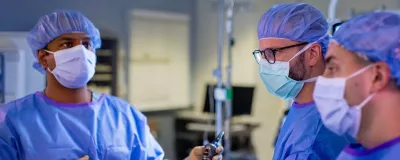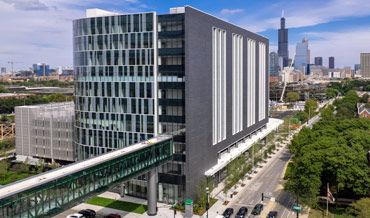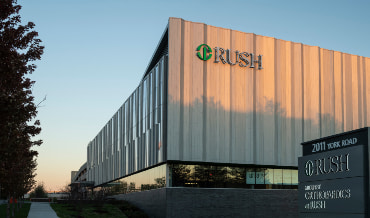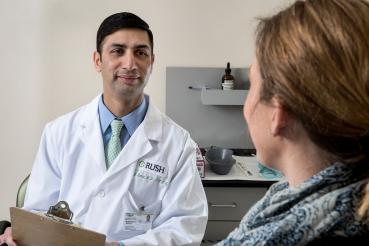The RUSH Approach to Pituitary Tumor Surgery
We understand that a pituitary tumor diagnosis can make you feel uncertain and overwhelmed. But with RUSH’s experienced pituitary surgery team guiding you along every step of the way, you can rest assured that you’ll receive the best care available.
The team relies on experts from multiple specialties, all working together, to provide you with patient-focused care.
Your care team will use the latest advances in technologies and safest treatments to ensure the best outcomes. With intraoperative CT and surgical navigation, your care providers can visualize the tumor during your procedure in real-time.
Treatment may include medication, surgery, radiation or watchful waiting. It depends on the tumor’s size and whether it is affecting your vision or making extra hormones.
The RUSH Brain Surgery Team

Non-Surgical Treatments for Pituitary Tumor
Some pituitary tumors can be treated without surgery or with therapies and techniques that can be combined with surgical treatments. Your physician will work with you to find the best plan for care. Some of the non-surgical treatments for pituitary tumors include:
- Medications: Drugs may be used to stop the tumor from growing and producing hormones.
- Radiation therapy: Radiation may be used in conjunction with medications and surgery. Rush offers stereotactic radiosurgery using the TrueBeam Stx radiosurgery system, which features pinpoint precision for tumors that are hard to reach or where surgical removal of the entire tumor is not possible or associated with significant risk.
- Hormone supplements: Hormone deficits caused by the tumor cannot be reversed and may require you to take hormone supplements.
- Watchful waiting: Depending on the size of the tumor and whether it is producing hormones, your provider may recommend simply monitoring the tumor with serial imaging, commonly referred to as watchful waiting.
Surgical Treatments for Pituitary Tumor
In some cases, surgery is needed to completely remove pituitary tumors, especially if a tumor is large or more complicated. This surgery is called a “craniotomy” or sometimes “transcranial surgery.” Your physician will discuss your options with you to make sure you’re getting the safest and most effective care.
During a craniotomy, the neurosurgeon makes an incision in the scalp and removes a piece of bone from the front of the skull. This allows them to see the tumor and remove it while preserving nerves and blood vessels in the brain.
Minimally Invasive Treatments for Pituitary Tumor
Most pituitary tumors can be removed through the nose in a procedure called transsphenoidal surgery. As an alternative to a craniotomy, which requires removing a portion of your skull to access the brain, this minimally invasive surgery allows for direct access to the tumor through your nose. Your physician may recommend this procedure if it is the best option for your care.
Pituitary Tumor Second Opinion Services
If you’ve been diagnosed with a pituitary tumor and your physician has made a recommendation for treatment, you may wish to get a second opinion. In fact, some health plans actually require one.
If your condition doesn’t require immediate treatment, your care provider may offer second opinion services. You can start by calling (312) 942-6644. Our team will help schedule an appointment and let you know how to prepare. We also offer virtual second opinions, so make sure to ask if this is an option for you when you call.
RUSH Excellence in Pituitary Tumor Surgical Care
- Specialized care: If you have a complex pituitary tumor, you can get help from our pituitary tumor specialists. Our team specializes in pituitary tumors and brings together the expertise of neurosurgeons, endocrinologists, ENT specialists and others to develop a care plan that addresses your symptoms and needs.
- Transsphenoidal surgery for less pain, faster recovery: If you need surgery, RUSH specializes in this minimally invasive option to remove the tumor through the nose, rather than cutting into the skull. This approach allows you to have a faster recovery and fewer functional and aesthetic side effects than traditional open surgery.
- Care close to you: Pituitary tumor surgeries are performed at the main RUSH campus in Chicago. However, our specialists can often perform your initial evaluation, imaging and follow-up care at locations that may be closer and more convenient for you including in Oak Brook, IL and Munster, IN.
- Nationally ranked care: The neurology and neurosurgery, ENT and endocrinology programs at RUSH University Medical Center, which all specialize in pituitary tumors, are ranked among the best in the nation, according to U.S. News & World Report.
FAQs About Pituitary Tumor Surgery
Pituitary tumor surgeries and outcomes vary from patient to patient, but they generally have a high success rate with few risks of complications. As with any type of surgery, rare complications can happen and may include bleeding or infections. Even more rarely, damage to the blood vessels, tissue or nerves in the brain can occur.
The type of surgery also affects outcomes. Transsphenoidal surgery is less invasive and may only result in minor symptoms for a week or two following the procedure. Craniotomy may result in a longer recovery time depending on the patient.
Listening to your physician’s guidance will reduce the risks of complications and ensure that recovery time is as quick as possible. Make sure you talk to your physician about what to expect and about follow-up care. They can give you the most accurate information for your specific procedure.
Recovery times for pituitary tumor surgery can vary depending on the size and location of the tumor, the type of surgery and your overall health. Generally, patients will need to stay in the hospital for a few days and then recover over the course of a few weeks or sometimes a few months. Patients who get transsphenoidal surgery may experience headaches or congestion for a week or two after the procedure but often return to their usual activities within six weeks. Your physician may also monitor your hormones or other aspects of your health and prescribe medication to help you stay healthy as you recover.
The answer is yes, pituitary tumor surgery is a type of brain surgery. Transsphenoidal surgery is minimally invasive and performed through the nasal cavity, while craniotomy involves removing part of the skull to reach the tumor. However, both are considered surgeries of the brain.









